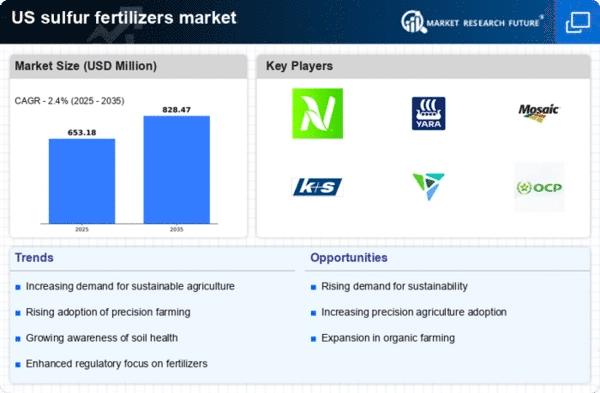Rising Global Food Demand
The sulfur fertilizers market is also driven by the increasing global food demand, which necessitates higher agricultural productivity. As the population continues to grow, particularly in urban areas, the pressure on farmers to produce more food intensifies. Sulfur fertilizers are recognized for their role in boosting crop yields, making them essential in meeting this demand. In the US, projections indicate that food production must increase by at least 30% by 2030 to keep pace with population growth. This urgent need for enhanced agricultural output is likely to propel the sulfur fertilizers market as farmers seek effective solutions to improve crop performance and ensure food security.
Rising Crop Nutrient Requirements
The sulfur fertilizers market is experiencing growth due to the increasing nutrient requirements of crops. As agricultural practices evolve, farmers are recognizing the essential role of sulfur in enhancing crop yield and quality. Sulfur is vital for the synthesis of amino acids and proteins, which are crucial for plant growth. In the US, the demand for sulfur fertilizers has surged, with a reported increase of approximately 15% in usage over the past few years. This trend indicates a shift towards more nutrient-dense crops, which is likely to drive the sulfur fertilizers market further. Additionally, the growing awareness among farmers about the benefits of sulfur in improving soil health and fertility contributes to this rising demand.
Increased Awareness of Soil Health
There is a growing recognition of the importance of soil health in the agricultural sector, which is significantly impacting the sulfur fertilizers market. Farmers are increasingly aware that healthy soil is fundamental to achieving optimal crop yields. Sulfur plays a crucial role in maintaining soil structure and fertility, which enhances nutrient availability. Recent studies indicate that soils deficient in sulfur can lead to reduced crop productivity, prompting farmers to incorporate sulfur fertilizers into their soil management practices. This heightened awareness is likely to drive the sulfur fertilizers market as more farmers seek to improve soil health and, consequently, crop performance.
Government Support for Sustainable Agriculture
The sulfur fertilizers market is positively influenced by government initiatives aimed at promoting sustainable agricultural practices. Various federal and state programs in the US are designed to encourage the use of environmentally friendly fertilizers, including sulfur-based products. These initiatives often provide financial incentives or subsidies to farmers who adopt sustainable practices. For instance, the USDA has implemented programs that support the use of sulfur fertilizers to enhance soil health and reduce environmental impact. This government backing not only boosts the adoption of sulfur fertilizers but also aligns with the broader goals of sustainability in agriculture, thereby fostering growth in the sulfur fertilizers market.
Technological Advancements in Fertilizer Application
The sulfur fertilizers market is benefiting from technological advancements in fertilizer application methods. Innovations such as precision agriculture and smart farming technologies enable farmers to apply sulfur fertilizers more efficiently and effectively. These technologies allow for targeted application based on soil nutrient levels and crop needs, minimizing waste and maximizing yield. In the US, the adoption of such technologies has been on the rise, with a reported increase of 20% in precision agriculture practices among farmers. This trend not only enhances the efficiency of sulfur fertilizers but also contributes to sustainable farming practices, thereby supporting the growth of the sulfur fertilizers market.
















